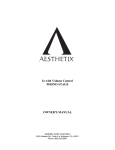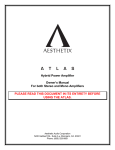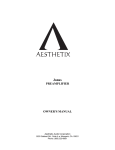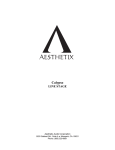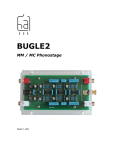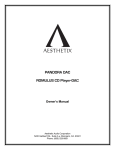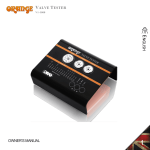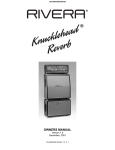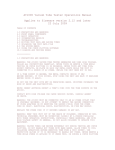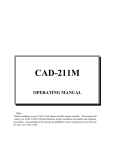Download Io PHONO STAGE OWNER`S MANUAL
Transcript
Io PHONO STAGE OWNER'S MANUAL Aesthetix Audio Corporation 5220 Gabbert Rd., Suite A ♦ Moorpark, CA. 93021 Phone: (805) 529-9901 INTRODUCTION Thank you for purchasing the Io Phono Stage. It has been engineered to deliver the highest attainable sound quality from your turntable. Only the highest grade electronic components are used in the Io, including: non-inductive wirewound resistors in the signal path; polystyrene, polypropylene, and Nichicon electrolytic power supply, bypass, and signal capacitors; low noise matched vacuum tubes; glass epoxy dual mono circuit boards; 20 gauge steel chassis; custom wound high flux power transformers. PLACEMENT The Io main unit should be located away from possible sources of hum such as power cords, power transformers and the like. It should not be located on top of its own power supply or any other heat source such as a power amplifier. It must be kept well ventilated for proper operation. If it is positioned within an enclosed space then fans may be warranted. All air vents must remain unobstructed. The power supply is the main source of heat and should therefore be positioned for adequate ventilation and away from the main unit, if possible. Placement of the power supply immediately below the main unit reduces tube life. 2 CONFIGURATION THE FOLLOWING PROCEDURES SHOULD ONLY BE ATTEMPTED WITH THE POWER CORD DISCONNECTED. INPUT IMPEDANCE: Note: If 47K ohms is the desired input impedance, the unit comes factory configured for this setting. The following instructions may be skipped. The input impedance of Io may be configured to virtually any useful value. On the back panel of the main unit, locate the section labeled “INPUT IMPEDANCE”. Two jumpers (and a spare) are supplied with Io, one for the left channel and one for the right. Locate the desired input impedance and its corresponding jumper position in the following table: IMPEDANCE 10K 4.75K 1K 475 243 121 75 40.2 20 10 JUMPER POSITION 10 9 8 7 6 5 4 3 2 1 Orient the supplied jumper vertically and insert onto protruding pins below the desired position number (use needle-nose pliers). Do the same for the remaining channel. If an intermediate not listed value of input impedance is desired, please contact the factory. Virtually any value is easily attainable. The correct loading will be achieved when music has the right balance of dynamics, high frequency extension and lack of glare or brightness. Generally speaking, less loading (higher ohms) results in more high frequencies and more dynamics but can be too bright with some cartridges. More loading (lower ohms) can reduce brightness but if overdone can result in reduced dynamics and a dull, lifeless quality. Consult your dealer for loading recommendations on the cartridge(s) you are using. One way is to start by setting the Io’s impedance to 10 times that of the cartridge, then listening and making minor adjustments to achieve the right balance of dynamics, high frequency extension and lack of glare or brightness. 3 GAIN ADJUSTMENT: Important note: Io with volume controls has no internal gain adjustment. Use volume controls. 1. Ensure that the power cord is disconnected from the Io preamp. 2. To ensure proper capacitor discharge, wait a minimum of 20 minutes before removing top cover. Inside an Io main unit there are two circuit boards, one for the left channel and one for the right. Each of these circuit boards contains two jumper blocks, which are used for setting the gain. Please refer to figure 3 for block locations. A block adjusts the gain for one phase of the balanced signal. To properly adjust the gain, both blocks for each channel must have the same jumper settings. There are two jumpers per block. Both jumpers on each block, need to be positioned for the same attenuation amount. Therefore changing the preamp gain means 8 jumpers on 4 blocks must be set. There are five possible gain settings which are represented as ATT 1, ATT 2, ATT 3, ATT 4 and ATT 5. The chart in figure 2 indicates each of these settings as a decibel (dB) range. Jumper ATT 1 ATT 2 ATT 3 ATT 4 ATT 5 Figure 1: Block Identity Attenuation Amount 0dB -6dB -12dB -18dB -30dB Overall Gain ~80dB ~74dB ~68dB ~62dB ~50dB Figure 2: Jumper Settings On each circuit board, only ATT 2, ATT 3 and ATT4 are marked, and only on one of the blocks. Therefore please refer to the ‘block’ diagram above for the complete ATT positions. Important Note: If using ATT 5, tubes V5 and V6 must be removed. 3. Set all 8 jumpers for the desired gain, according to the information above and in figures 1-3. 4. Replace top cover and screws. 5. Test unit. 4 Figure 3: Io Preamp Circuit board (1 of 2) CONNECTIONS CAUTION: It is vitally important that you do NOT disconnect the umbilical cables (between the power supply and main unit) for AT LEAST 15 MINUTES AFTER TURNING OFF THE MAIN POWER SWITCH and removing the AC cord from the power supply. Note: Never connect power supply's power cord to a wall outlet while umbilical cables are disconnected. A. Connect male end of one of the supplied umbilical cables to a power output jack on the power supply. This is a keyed connector so proper alignment is necessary for correct pin connection. Important note: Io umbilical cables are 19 pin (for single supply operation) or 21 pin (for dual supply operation). Do not use umbilical cables with fewer pins than required. No damage will occur, but certain tubes will not receive heater supply voltage. B. Connect female end of the same umbilical cable to a male receptacle on the main unit. C. Connect male end of the other supplied umbilical cable to the remaining power output jack on the power supply. D. Connect female end of the same umbilical cable to the remaining male receptacle on the main unit. E. Connect turntable to the Io using either RCA or XLR connectors. F. Connect Io to either a preamp line level input or a linestage input using the XLR or RCA connections. G. Because the Io contains no turn-on mute circuitry the following procedure is recommended anytime the Io is initially turned on: Ensure that either the power amplifier is off or the linestage (preamp) is selected to an input different from the one Io is connected to. This will prevent any turn-on artifacts from reaching loudspeakers. H. Connect power cord of the power supply to an unswitched grounded wall outlet. It is not recommended to use any sort of line conditioner with the Io. Any failure caused by such a device will not be covered under warranty. 6 OPERATION *Ensure linestage/preamp and/or power amp are properly muted to prevent possible damage to speakers. A. Turn power on. B. Wait at least fifteen minutes for power supplies to fully stabilize before unmuting preamp. C. Begin playing record. D. If the optional second input is installed, before switching inputs mute the preamp. E. Always unmute linestage with volume fully counter-clockwise and then slowly increase the volume until desired listening level is achieved. F. Mute linestage before lifting stylus from record. This will prevent any unwanted noises from reaching the speakers. G. Before turning Io off, ensures that preamp/linestage and/or power amp are properly muted. H. Turn off Io. 7 TECHNICAL DESCRIPTION NOTE: The following is a detailed technical description of the circuitry employed in the Io. It is intended for technically inclined readers for informational purposes only. The Io comprises two separate units, the phono stage itself and the power supply unit. The units are connected together via two detachable umbilical cords. The phono stage contains three main amplification sections and an output buffer section. The first section is a high gain, low noise, zero feedback single ended amplifier composed of two low-noise 12AX7 vacuum tubes. This then feeds a high gain, low noise differential amplifier (two 12AX7 vacuum tubes) which amplifies the signal and produces a complementary minus phase signal. Thus, the unit is balanced from the second amplification section through the output. The signal is then applied to the third amplification section which is nearly identical to the second. It also contains two 12AX7 vacuum tubes. The filter is next in the signal path, a purely passive design with the highest grade capacitors and non-inductive wirewound resistors throughout. Lastly, the signal is buffered and sent to the output jacks in balanced form. Each separate amplification section has its own power supply filtering network and regulated heater supply to isolate the individual sections and prevent them from interacting. The Power Supply has two main sections, the heater power supplies and the primary plus and minus power supplies. The heart of the heater supply is its massive, low flux, 210 volt-amp power transformer which has no less than fourteen separate secondary windings that are individually regulated and supply both the power supply and main unit tubes. The primary high voltage supply is composed of a similarly massive 170 volt-amp transformer which feeds a common-mode choke input filtering network and then high current vacuum tube regulators (one EL34/6CA7, three 12AX7 tubes per regulator). Each regulator is capable of supplying 600 volts at 100mA. There are two such regulators in the power supply. Specifications (117v only) Fuses: External heater fuse External high voltage fuse External heater fuse External high voltage fuse 2 amp slow blow for 117V units 2 amp slow blow for 117V units 1 amp slow blow for 230V units 1 amp slow blow for 230V units 8 Io phono stage vacuum tube locations Back of left channel circuit board Back of right channel circuit board XLR XLR V2 V1 V2 First gain stage 12AX7LP or E83CCS V7 6922 Output stage V4 Output stage V3 Second gain stage V3/V4 12AX7 or E83CCS V8 6SN7 V4 V3 Second gain stage V3/V4 12AX7 or E83CCS 6SN7 V5 V6 V1 First gain stage 12AX7LP or E83CCS V7 6922 V8 XLR XLR V5 Third gain stage V5/V6 - 12AX7 or E83CCS V6 Third gain stage V5/V6 - 12AX7 or E83CCS Volume Volume Control Control (Optional) (Optional) Phono 2.3 Phono 2.3 Front of left channel circuit board Front of right channel circuit board V1 and V2 = 12AX7 or E83CCS V3 – V6 = 12AX7 or E83CCS V7 = 6922 V8 = 6SN7 9 90 DAY LIMITED WARRANTY TERMS AND CONDITIONS (3 Year optional extended service contract) 1. Aesthetix warrants the product designated herein to be free of manufacturing defects in material and workmanship, subject to the conditions herein set forth, for a period of 90 days from the date of purchase by the original purchaser. If the purchaser registers the unit with Aesthetix by mailing in the warranty card, together with a copy of the bill of sale, within 14 days of the date of purchase, said purchaser will be registered for an extended service contract. The extended service contract extends the 90 days to a period of 3 years from the date of purchase by the original purchaser or no later than 4 years from the date of shipment to the authorized Aesthetix dealer, whichever comes first. The warranty period for factory tubes does not get extended and therefore remains at 90 days. 2. CONDITIONS This warranty is subject to the following conditions and limitations. The warranty is void and inapplicable if the product has been used or handled other than in accordance with the instructions in the owner's manual, abused or misused, damaged by accident or neglect or in being transported, or the defect is due to the product being repaired or tampered with or modified by anyone other than Aesthetix. The product must be packed and returned to Aesthetix by the customer at his or her sole expense. A returned product must be accompanied by a written description of the defect and a photocopy of the original purchase receipt. This receipt must clearly list model and serial number, the date of purchase, the name and address of the purchaser and authorized dealer and the purchase price. Aesthetix reserves the right to modify the design of any product without obligation to purchasers of previously manufactured products and to change the prices or specifications of any product without notice or obligation to any person. 3. REMEDY In the event the above product fails to meet the warranty, and the above conditions have been met, the purchaser's sole remedy under the limited warranty shall be to return the product to Aesthetix where the defect will be rectified without charge for parts or labor. 4. LIMITED TO ORIGINAL PURCHASER This warranty is for the sole benefit of the original purchaser of the covered product and shall not be transferred to a subsequent purchaser of the product. 5. DURATION OF WARRANTY This warranty expires 90 days after the date of original purchase. If Aesthetix receives the warranty registration card, this period is extended to the third anniversary of the date of purchase or no later that the fourth anniversary of the shipment to the authorized Aesthetix dealer, whichever comes first. The warranty period for factory tubes does not get extended and therefore remains at 90 days. 6. MISCELLANEOUS ANY IMPLIED WARRANTIES RELATING TO THE ABOVE PRODUCT SHALL BE LIMITED TO THE DURATION OF THIS WARRANTY. THE WARRANTY DOES NOT EXTEND TO ANY INCIDENTAL OR CONSEQUENTIAL COSTS OR DAMAGES TO THE PURCHASER. Some states do not allow limitations on how long an implied warranty lasts or an exclusion or limitation of incidental or consequential damages, so the above limitations or exclusions may not apply to you. This Warranty gives you specific legal rights, and you may also have other rights which vary from state to state. 7. WARRANTY OUTSIDE THE USA Aesthetix has formal distribution in many of the countries of the free world, in each country the Aesthetix importer has contractually accepted the responsibility for product warranty. Warranty should normally be obtained from the importing dealer or distributor from whom you obtain your product. 10 Rev 2.8 4-8-14










